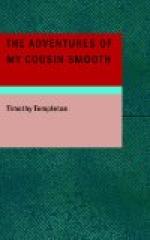of fine-cut tobacco, and sundry very bad writing materials.
In one corner of the room spread out a green screen,
behind which was various simple but very useful ware;
this, together with two extra chairs for strangers,
standing at the other corner, constituted the furniture.
There was a strong legal air about the table, notwithstanding
its promiscuous burden. At the head of it sat
like Cicero—but he had none of Cicero’s
genius in his soul!—a man moody of countenance
and portly of person: he was called the Umpire,
and they said he was chosen because of his birthplace
being America. Some had gone so far as to characterize
the choice an evidence that Mr. Bull was inclined
to act upon the square, and permit Cousin Jonathan
to have it all his own way,—never for once
keeping in mind that it mattered but little where a
man’s birthplace was, if he had long since forgotten
the spirit of its institutions. Indeed, as far
as sympathy and manners are concerned, an American
may be more than an Englishman, and
vice versa.
Smooth does not mean to insinuate that the case is
illustrated in the present functionary, whose face
was of that stern cast which at times would lead to
believe it unhappy under the fatigue of a too solid
body. To this singularly stern face was added
a nose, facetious gentlemen might be inclined to call
the ripening fruits of good wine, while pervading all
was an air of sordidness curiously at variance with
the good parts repute asserted he possessed.
Smooth would have taken him for a man whose mind was
of a mechanical turn; for at times he would become
dreamy, his eyes would close within leaden lids, and
his body seem prone to cool away into sleep’s
gentlest embrace. Again he would, as if with
much effort, raise those leaden eyelids, draw forth
a languid breath, stretch his arms athwart, and, as
if ’twere pain, listen to the legal logic boring
its dryness into his very soul. The tax did indeed
seem beyond his power of endurance.
“Being introduced all round, Smooth commenced
the conversation by saying, in a warm and good-natured
sort of way:—’Well, Citizens!—how
do ye make out to get time over the bank? S’pose
it’s because Uncle Sam stands at the gangway
serving the shot?’ They did not seem to brighten
up at this remark. It was evidently viewed as
rather out of place; for the Umpire quickened his
nodding, and the other five functionaries constituting
the convention permitted their faces to yield looks
by no means significant of good-nature. Quoth,
by the way of conventionality, were they right glad
to see Minister Smooth; further, they shook him warmly
by the hand, and made many inquiries about Pierce
and his policy—a thing he never had, hence
the impossibility of enlightening them. Mr. Pierce
had an eye to Cuba, but no policy whatever with regard
to the getting of it: in addition to this, Pierce
himself so far defied analyzation that many grave and
experienced diplomatists had declared the problem beyond
their power to solve.




